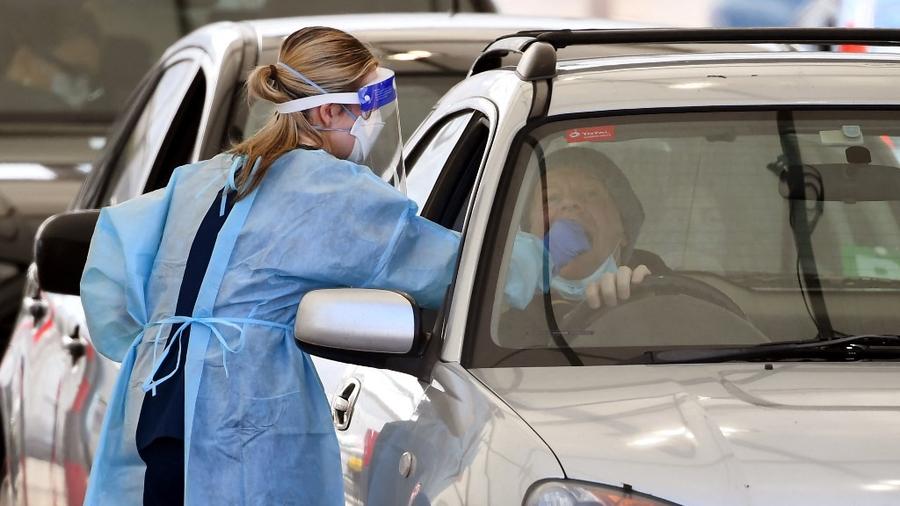 A medical worker collects a swab sample at a drive-through COVID-19 testing station in Melbourne, Australia, on Aug 19, 2021. (WILLIAM WEST / AFP)
A medical worker collects a swab sample at a drive-through COVID-19 testing station in Melbourne, Australia, on Aug 19, 2021. (WILLIAM WEST / AFP)
TEHRAN / MANILA / SINGAPORE / WELLINGTON / SYDNEY / NEW DELHI / SEOUL / DHAKA / CANBERRA - Australia's Prime Minister Anthony Albanese has ruled out cutting the coronavirus isolation period from seven days.
Australia's Prime Minister Anthony Albanese on Monday said it is "not the time" to consider winding back the isolation period amid surging case numbers in the current winter months
Albanese on Monday said it is "not the time" to consider winding back the isolation period amid surging case numbers in the current winter months.
Dominic Perrottet, Premier of the country's most populous state of New South Wales, has called for the federal government to consider cutting that period.
In response, Albanese said no change was imminent.
"The advice that is there from the Chief Medical Officer, Professor Kelly, was that now is certainly not the time for that to be reconsidered," he told South Australian radio station FIVEaa.
"That's something health officials will continue to look at. But given the increased spread of the COVID-19 virus in recent times that we'll see continuing, it's expected to peak over coming weeks, now's not the time to change those provisions which are there."
ALSO READ: India's COVID vaccinations hit 2b, new cases at 4-month high
Coronavirus case numbers in Australia are expected to spike in the coming weeks, with authorities warning that "it's likely" some millions of Australians will catch COVID-19.
More than 35,000 new COVID-19 cases and over 20 deaths were reported across Australia on Monday.
It comes at a time when influenza cases continue to soar.
According to the latest Australian Influenza Surveillance Report, there had been 187,431 confirmed flu cases in Australia as of July 3 and 113 deaths.
Of those cases, 36,719 were reported in the two weeks leading up to July 3.
"From mid-April 2022, the weekly number of notifications of laboratory-confirmed influenza reported in Australia has exceeded the five-year average," the report said.
More than 1,300 cases have required hospitalization for treatment, 6.5 percent of which were admitted directly to intensive care.
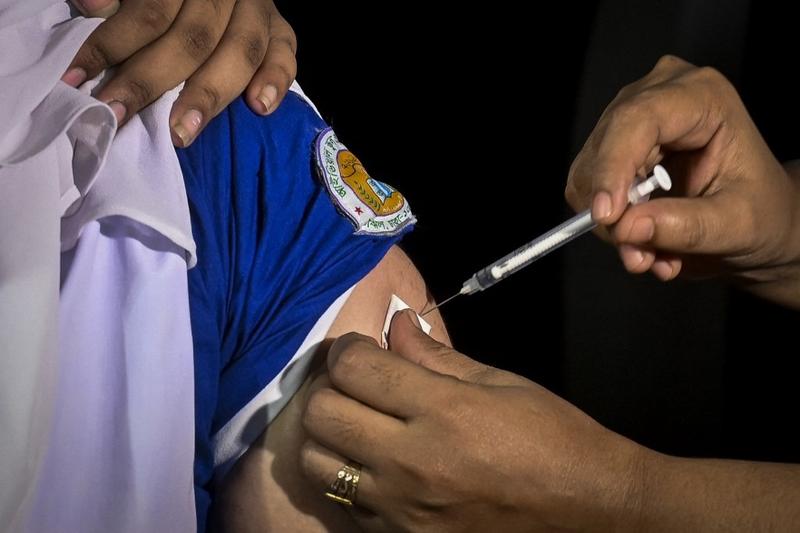 A health worker inoculates a student of a higher class with a jab of COVID-19 coronavirus vaccine inside a school premises in Dhaka on Nov 1, 2021 as per a directive by the government. (MUNIR UZ ZAMAN / AFP)
A health worker inoculates a student of a higher class with a jab of COVID-19 coronavirus vaccine inside a school premises in Dhaka on Nov 1, 2021 as per a directive by the government. (MUNIR UZ ZAMAN / AFP)
Bangladesh
Bangladesh's first homegrown COVID-19 vaccine has obtained clearance for human trial in phase I.
The Bangavax vaccine, developed by local pharmaceutical company Globe Biotech, on Sunday received clearance from the Directorate General of Drug Administration under the Ministry of Health and Family Welfare after the relevant authorities reviewed all the documents on all the previous trials.
"We've got the approval for phase I clinical trial of Bangavax," Mohammad Mohiuddin, a senior official at Globe Biotech, told reporters.
He said the trial will be conducted among 60 healthy volunteers at Bangabandhu Sheikh Mujib Medical University hospital in Dhaka.
In November last year, Bangavax, a single-dose COVID-19 vaccine, got ethical clearance from the Bangladesh Medical Research Council for a human trial on up to 64 healthy adult participants.
Globe Biotech applied for approval for a human trial on Nov. 1 last year, saying its vaccine has yielded "good results" in trials on monkeys.
The vaccine can reportedly be stored at a temperature of 4 degrees Celsius for one month and of -20 degrees Celsius for up to six months.
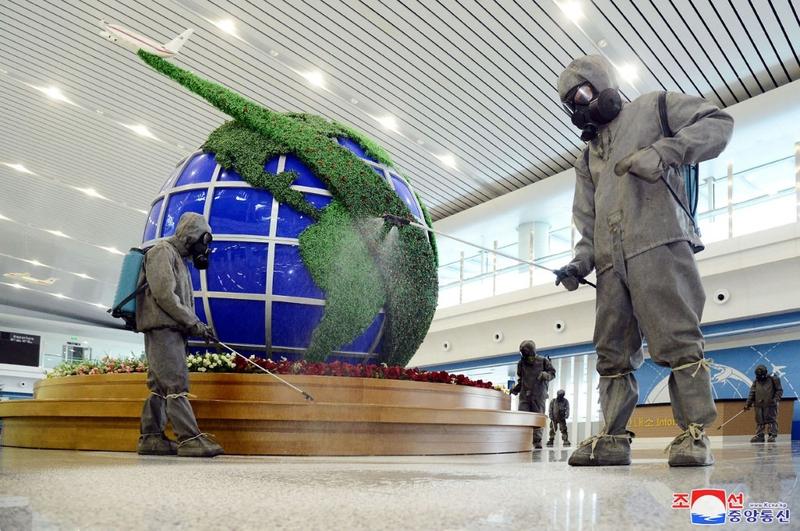 This picture taken on June 10, 2022 and released from the Democratic People's Republic of Korea's official Korean Central News Agency on June 11 shows workers disinfecting the interior of Pyongyang International Airport as part of measures against the COVID-19 coronavirus. (STR / KCNA VIA KNS / AFP)
This picture taken on June 10, 2022 and released from the Democratic People's Republic of Korea's official Korean Central News Agency on June 11 shows workers disinfecting the interior of Pyongyang International Airport as part of measures against the COVID-19 coronavirus. (STR / KCNA VIA KNS / AFP)
Democratic People's Republic of Korea
The Democratic People's Republic of Korea is on the path to "finally defuse" a crisis stemming from the outbreak of COVID-19, the state news agency said on Monday, while Asian neighbors battle a fresh wave of infections driven by Omicron subvariants.
The Democratic People's Republic of Korea said 99.98 percent of its 4.77 million fever patients since late April have fully recovered
The DPRK says 99.98 percent of its 4.77 million fever patients since late April have fully recovered.
"The anti-epidemic campaign is improved to finally defuse the crisis completely," KCNA said. It added that the DPRK had reported 310 more people with fever symptoms.
Daily new cases of fever in the DPRK reported by KCNA have been declining since mid-May.
The DPRK also said it has been developing new methods to better detect the virus and its variants, as well as other infectious diseases, such as monkeypox.
The DPRK's claim of "anti-epidemic stability" comes as other Asian countries grapple with a new wave of infections.
In the neighboring the Republic of Korea, daily COVID-19 infections jumped on Tuesday above 40,000 for the first time in two months, with authorities and experts predicting hundreds of thousands of new cases in coming weeks.
Japan also warned that a new wave of infections appeared to be spreading rapidly, as Prime Minister Fumio Kishida called for special care ahead of school summer vacations.
Tokyo's 16,878 new cases on Wednesday were the highest since February, while the nationwide tally rose above 90,000, in a recent surge of infections to levels unseen since early this year.
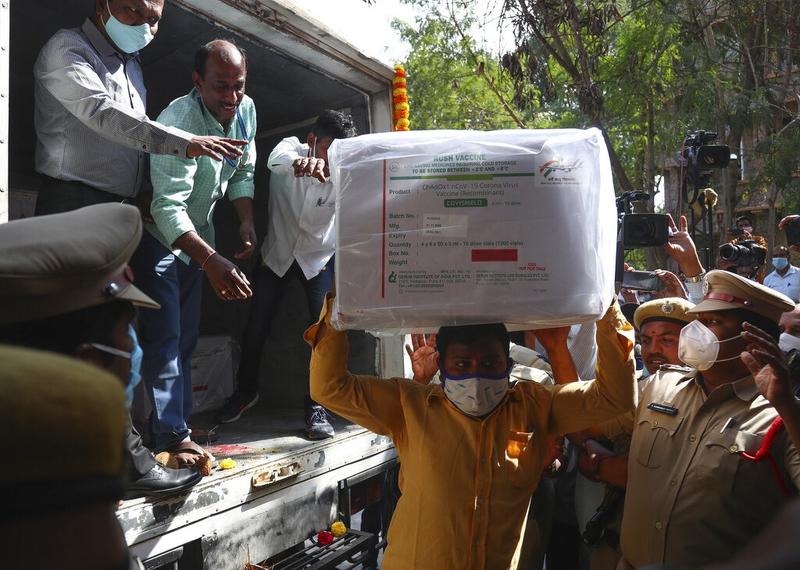 Health workers shift a box containing COVID-19 vaccines from a vehicle to a cold storage at the Commissionerate of Health and Family Welfare in Hyderabad, India, Jan 12, 2021. (MAHESH KUMAR A. AP)
Health workers shift a box containing COVID-19 vaccines from a vehicle to a cold storage at the Commissionerate of Health and Family Welfare in Hyderabad, India, Jan 12, 2021. (MAHESH KUMAR A. AP)
India
After four straight days of reporting over 20,000 new cases a day, India's COVID-19 daily caseload on Monday came down to 16,935, officials said.
According to health ministry data released on Monday morning, 16,935 new cases of COVID-19 were reported during the past 24 hours, taking the total tally to 43,767,534 in the country, and the active caseload currently stands at 144,264.
India also logged 51 COVID-19-related deaths during this period, which has pushed the overall death toll to 525,760 since the beginning of the pandemic, the ministry said.
With the increase in cases, the daily positivity rate stood at 6.48 percent and the weekly positivity rate was recorded 4.58 percent, the ministry data showed.
The ministry said 43,097,510 people have been successfully cured and discharged from hospitals, of whom 16,069 were discharged during the past 24 hours.
According to the health ministry, the cumulative COVID-19 vaccination coverage in the country exceeded 2 billion doses as 2,000,461,095 doses have been administered until Monday morning.
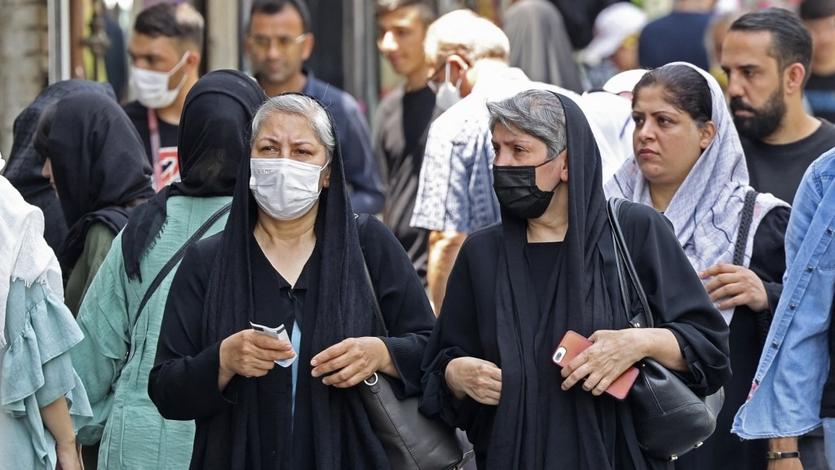 Women wearing headscarves walk in the streets of Tehran near, Tajrish Square, on July 12 2022. (ATTA KENARE / AFP)
Women wearing headscarves walk in the streets of Tehran near, Tajrish Square, on July 12 2022. (ATTA KENARE / AFP)
Iran
Iranian Health Minister Bahram Einollahi said on Sunday that the seventh wave of COVID-19 infections has started in the country, official news agency IRNA reported.
The Iranian Health Ministry reported 5,751 new COVID-19 cases on Sunday, while 13 people died from the virus over the past 24 hours
At a press conference, he called on the people to receive a booster dose of vaccines and observe the health protocols especially wearing face masks in crowded indoor places.
The Iranian Health Ministry reported 5,751 new COVID-19 cases on Sunday, while 13 people died from the virus over the past 24 hours.
ALSO READ: India's COVID vaccinations hit 2b, new cases at 4-month high
Among the new cases are 656 hospitalized, of whom 516 are in critical condition, the ministry said.
Since the coronavirus outbreak in Iran in late February 2020, 7,278,478 people have been infected with the virus, including 141,499 deaths, it added.
New Zealand
New Zealand recorded 7,612 new community cases of COVID-19 and 22 more deaths from the pandemic, the Ministry of Health said on Monday.
In addition, 363 COVID-19 cases have recently traveled overseas, it said.
Currently, 797 COVID-19 patients are being treated in hospitals, including 20 in intensive care units or high dependency units.
New Zealand has reported 1,498,402 confirmed cases of COVID-19 since the pandemic hit the country in early 2020.
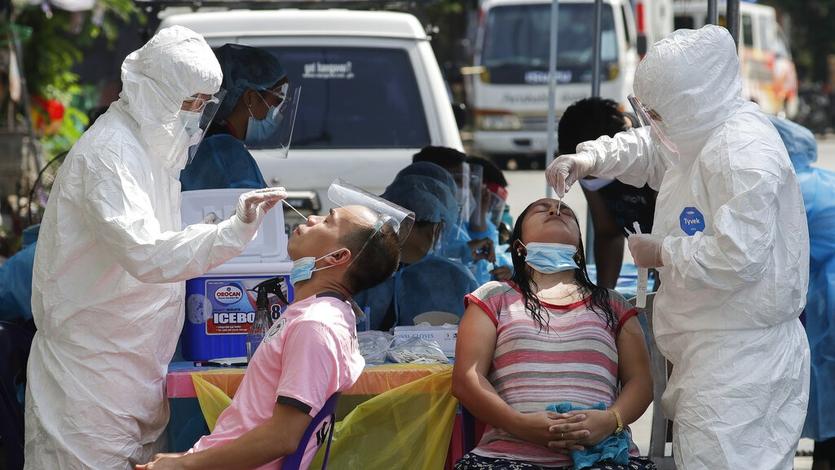 Health workers conduct COVID-19 swab tests on residents at a village in Quezon City, the Philippines on May 31, 2021. (AARON FAVILA / AP)
Health workers conduct COVID-19 swab tests on residents at a village in Quezon City, the Philippines on May 31, 2021. (AARON FAVILA / AP)
Philippines
The Philippines' Department of Health reported 2,560 new COVID-19 infections on Sunday, bringing the number of confirmed cases in the Southeast Asian country to 3,733,101.
The DOH said the number of active cases climbed to 19,873, the highest since April 18. The agency has reported over 2,000 new cases for the fourth straight day, but the hospitalization rate remains low despite the rising number of infections.
The Philippines reported the highest single-day tally of new COVID-19 infections at 39,004 cases on Jan. 15. The country, with an around 110 million population, has fully vaccinated over 71 million people.
Republic of Korea
The Republic of Korea reported 26,299 new COVID-19 cases as of midnight Sunday compared to 24 hours ago, raising the total number of infections to 18,788,056, the health authorities said Monday.
The daily caseload was down from 40,342 in the previous day on fewer virus tests over the weekend, but it doubled from 12,681 tallied a week earlier, according to the Korea Disease Control and Prevention Agency.
For the past week, the daily average number of confirmed cases was 37,660.
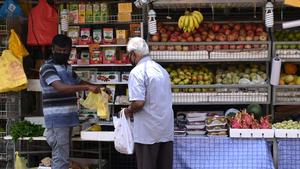 A vendor wearing a protective facemask amid fears about the spread of the COVID-19 coronavirus serves a customer at a fruit stall in Singapore on May 8, 2020. (ROSLAN RAHMAN / AFP)
A vendor wearing a protective facemask amid fears about the spread of the COVID-19 coronavirus serves a customer at a fruit stall in Singapore on May 8, 2020. (ROSLAN RAHMAN / AFP)
Singapore
Singapore reported 6,947 new cases of COVID-19 on Sunday, bringing the total tally to 1,596,046.
Of the new cases, 694 cases were detected through PCR (polymerase chain reaction) tests and 6,253 through ART (antigen rapid test) tests, according to statistics released by the Ministry of Health.
Among the PCR cases, 653 were local transmissions and 41 were imported cases. Among the ART cases with mild symptoms and assessed to be of low risk, there were 5,985 local transmissions and 268 imported cases, respectively.
A total of 789 cases are currently warded in hospitals, with 14 cases in intensive care units.
Three deaths from COVID-19 were reported on Sunday, bringing the total death toll to 1,453, the ministry said.


